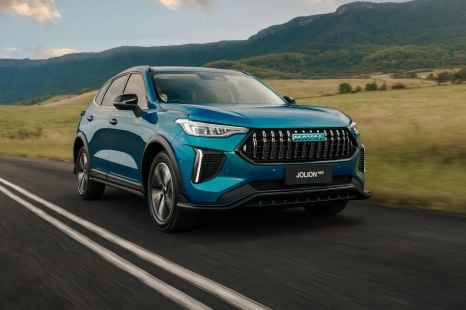

Max Davies
2026 GWM Haval Jolion price and specs
7 Hours Ago
The updated and revamped Toyota Corolla Sedan range sees big price hikes, but remains a compelling choice for buyers.
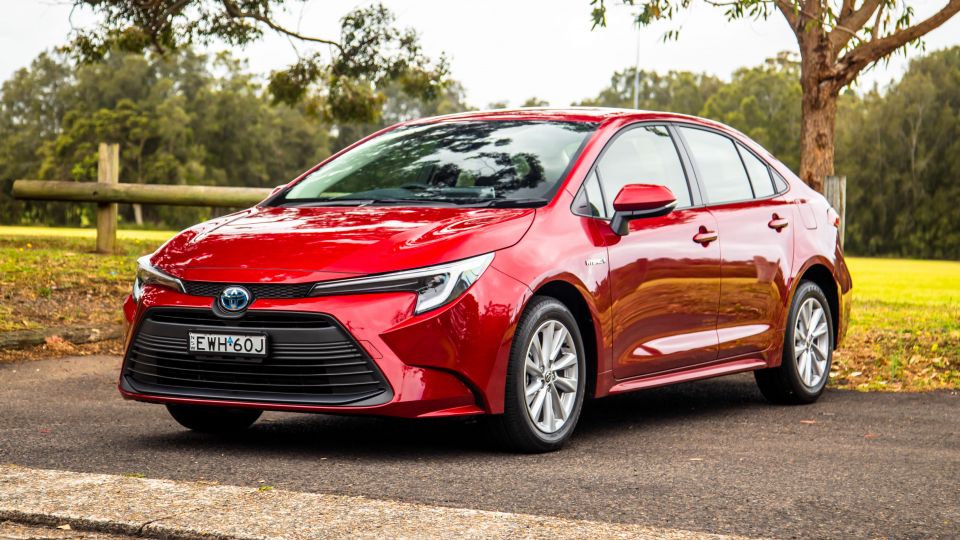
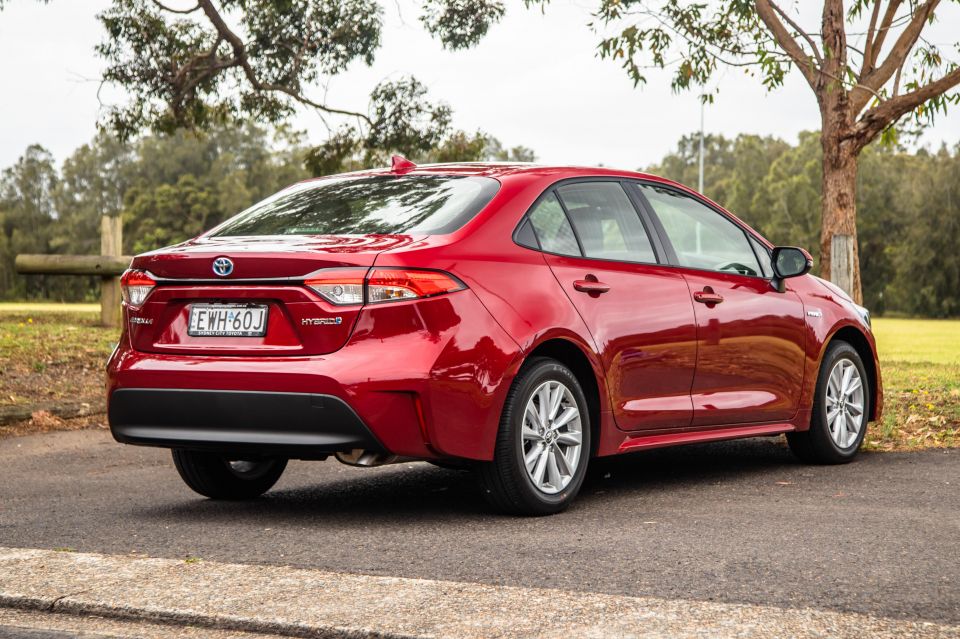

Senior Contributor

Senior Contributor


Senior Contributor

Senior Contributor
Where expert car reviews meet expert car buying – CarExpert gives you trusted advice, personalised service and real savings on your next new car.
If you’re in the market for a small, affordable hybrid sedan, meet your only option – literally. You have no other choices.
That’s because the Toyota Corolla Sedan owns this part of the market to such an extent that no other brands dare even enter the market. Or maybe it’s that the market for compact petrol-electric three-box models is actually quite small.
You can get it as a hatchback too, of course. And now the Corolla name has even spread to crossover land, with the new Corolla Cross compact SUV expanding the Japanese company’s stranglehold on the market.
While there is a mild-hybrid Mazda 3 to sort-of compete against the Corolla, this car is supremely efficient and has just been improved with a host of changes for 2023.
This review is focused on the base 2023 Toyota Corolla Sedan Ascent Sport Hybrid, but I’ll cover off the things you might want to consider if you’re shopping for a Corolla sedan, including what you might want to pay more for.

The hybrid version of the Ascent Sport sedan is priced from $31,180 before on-road costs. That’s $3000 more than the petrol version, which uses lots more fuel.
Just over $30,000 might seem like a pretty decent price for a hybrid small car in 2023, but consider this – if you’d bought the 2022 version, you’d have saved a huge $3785. That’s how much the price has jumped up for this particular petrol-electric Corolla Sedan, and it’s the biggest bump in price across the updated model range.
You’ll need to spend $1000 more if you want blind-spot monitoring and rear cross-traffic alert, which seems rude considering the 14 per cent price hike. In my opinion, that should be standard. More on the standard inclusions in that section below.
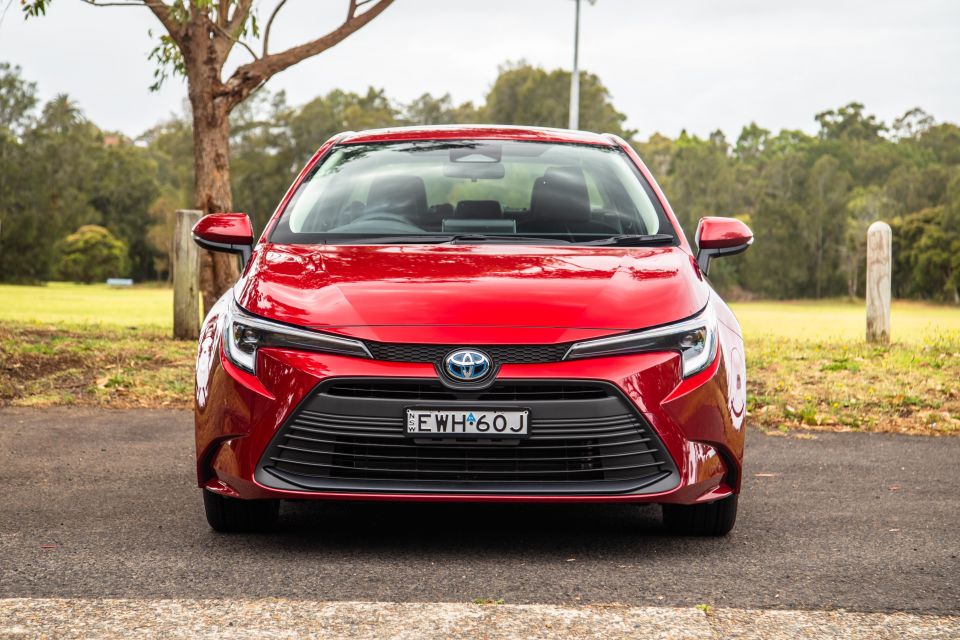
Spend up on the SX grade ($31,280 for Petrol; $33,780 for Hybrid) if you want an auto-dimming rearview mirror, rain-sensing wipers, DAB+ digital radio, wireless phone charging, leatherette steering wheel and shifter, LED fog-lights and privacy glass (as well as blind-spot and RCTA). You get standard sat nav on the SX petrol, too – it’s standard on all hybrid-powered Corolla sedans.
And if you need a sportier looking Corolla Sedan, choose the ZR ($36,620 Petrol; and the new ZR Hybrid sedan, which is $39,120).
You’ll score bigger 18-inch alloy wheels, heated front sports seats, power adjustable driver’s seat, leatherette seat trim, a head-up display, a new 12.3-inch digital instrument cluster, ambient lighting and a nine-speaker JBL sound system.
MORE: 2023 Toyota Corolla price and specs
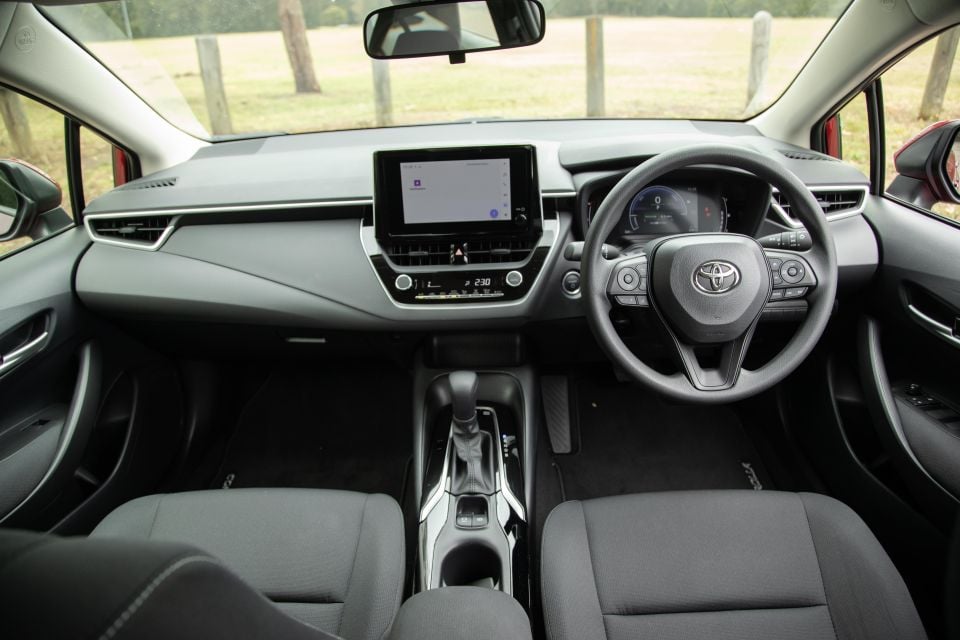
Buy your new car without the stress. It's fast, simple and completely free.

Great service from Travis and team, second time I have used this business would not hesitate to recommend them to anyone
Craig C.
Purchased a Ford Ranger in Sunshine Coast, QLD
CarExpert helped Craig save thousands on his Ford Ranger, now let us save you on your next new car.
Find a dealIf you are the sort of person who longs for a truly luxurious experience when they hop into a brand-new car, this won’t be the car for you.
That isn’t to say that there aren’t some nice features of the cabin, though. The stitching on the cloth seats looks quite nice, and the media system sits high and proud, which does offer some kind of visual appeal. Plus the new digital instrument cluster is a nice touch as well.
But beyond that, a lot of the finishes and styling in this spec of Corolla are workmanlike.
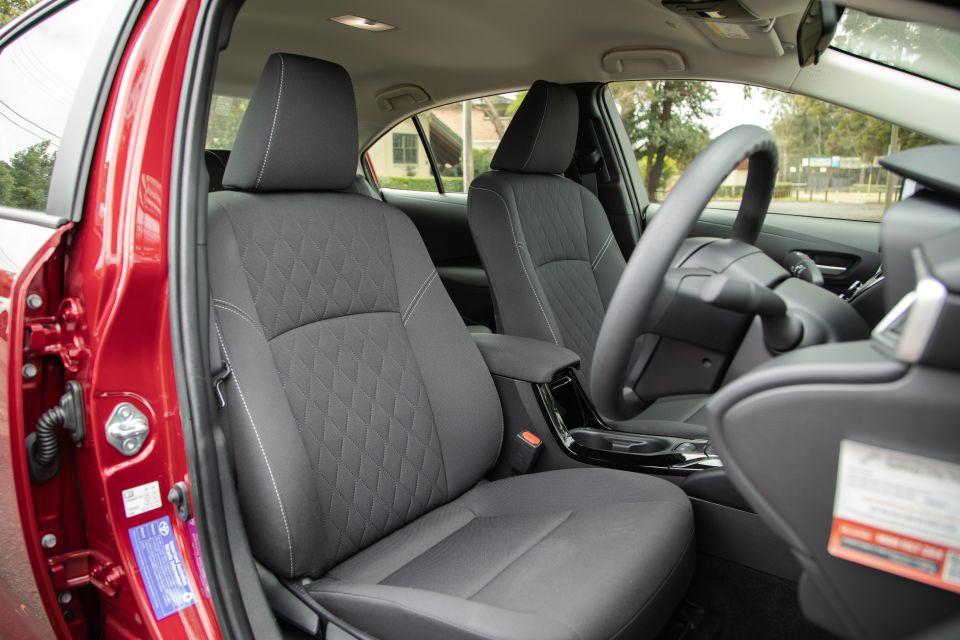
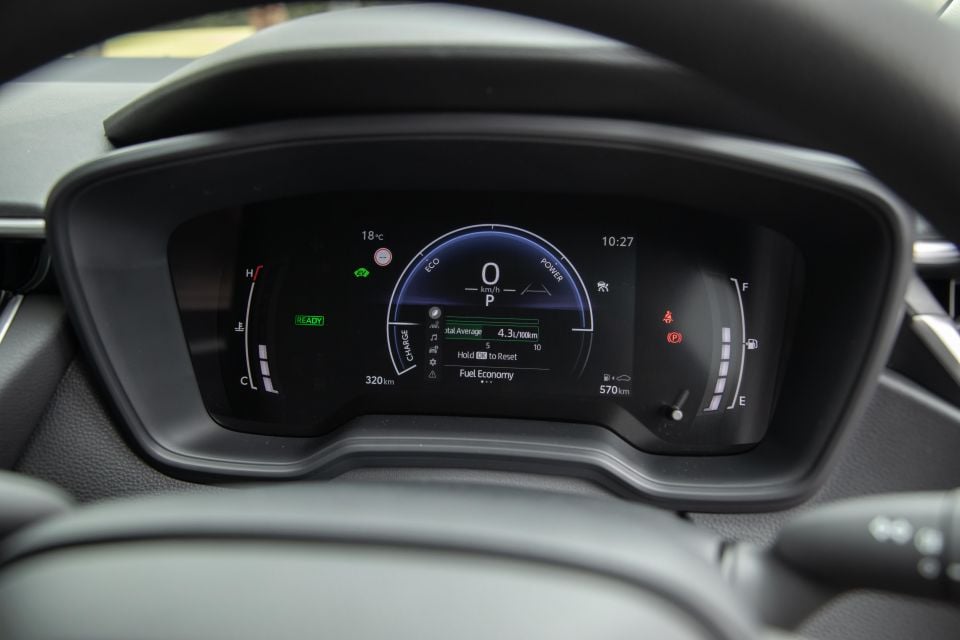
There is a plastic steering wheel and gear shift selector, neither of which are overly pleasant to hang onto for long periods of time. At least the steering wheel button setup is easy to come to grips with.
There are soft-touch plastics on the dashboard, but not on the door tops. And the hard plastic continues down below the sightline, with hard plastic on the transmission tunnel surround (where you might rest your leg).
There’s some piano black to lift the ambience a little bit, but it’s still a dark-grey-on-lighter-grey-on slightly-less-grey look.
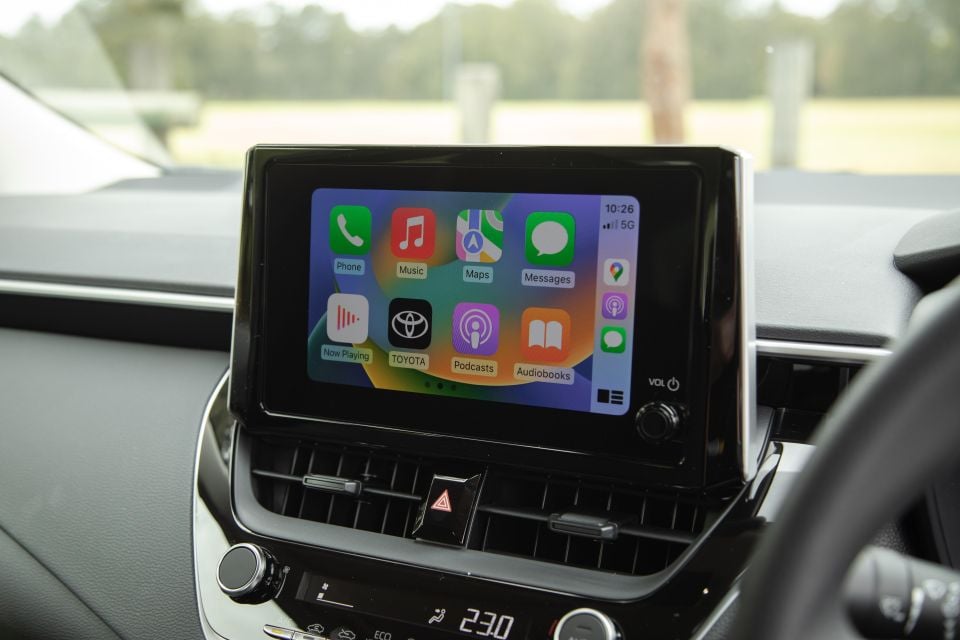
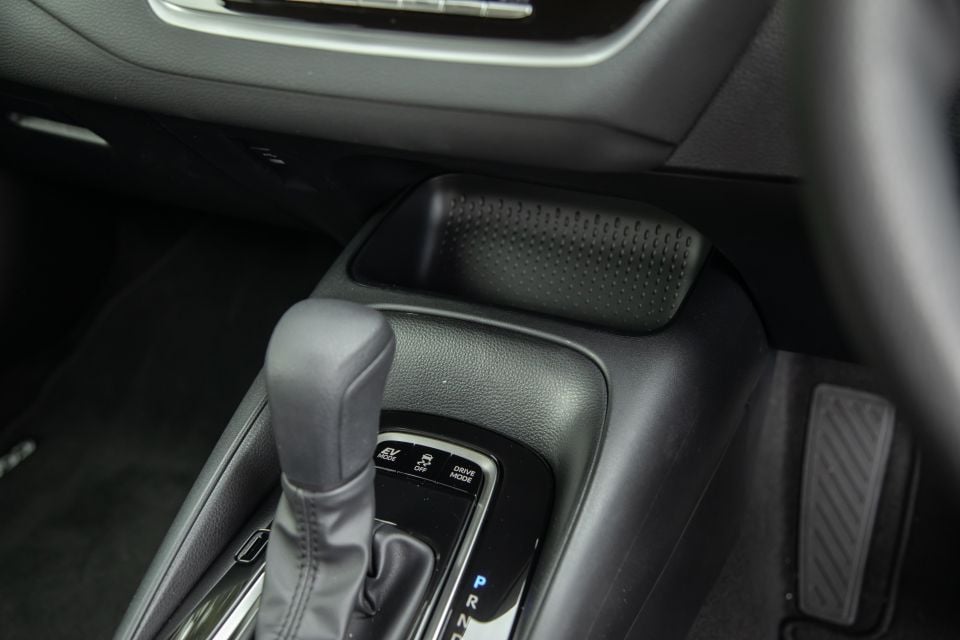
In terms of storage, there are cupholders between the front seats, bottle holders in both doors, a compact glovebox, and a small storage cubby in front of the shifter – you will find the USB-C port there as well, but there is only one USB port in the entire car!
There is a covered centre armrest between the front seats that has a 12V port that you could run a twin USB charger out of if you’ve got needy passengers… or if you run it as an Uber car.
In front of the gear shifter you’ll also find a couple of buttons – EV Mode, Drive Mode (Normal, Sport, Eco), and traction control off. There’s also an electronic park brake trigger behind the shifter as well, which is a nice touch.
You get single-zone climate control with an eco mode, which you might use if you are concerned about how much draw that A/C system is putting on your fuel consumption.
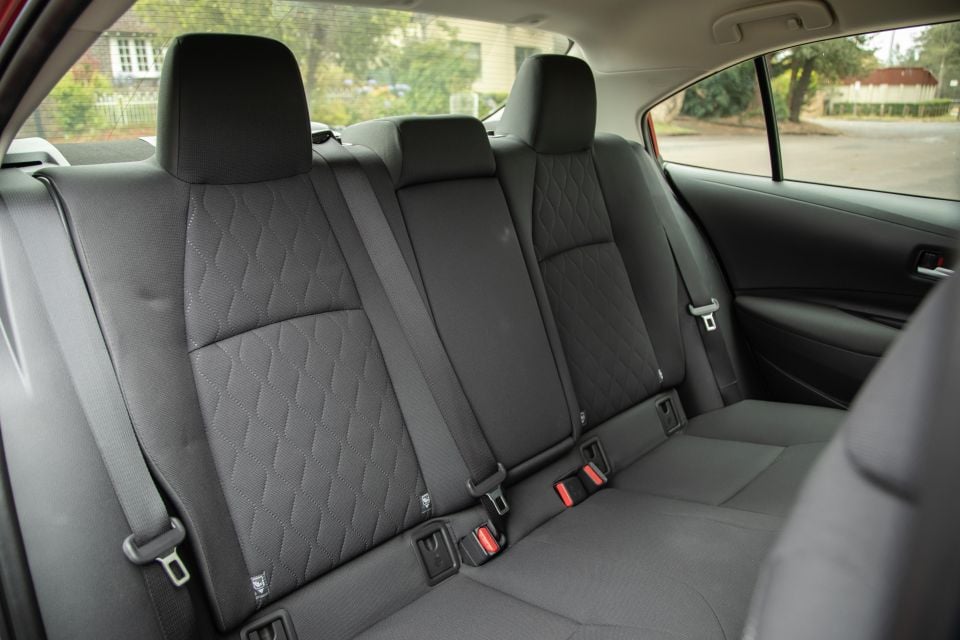
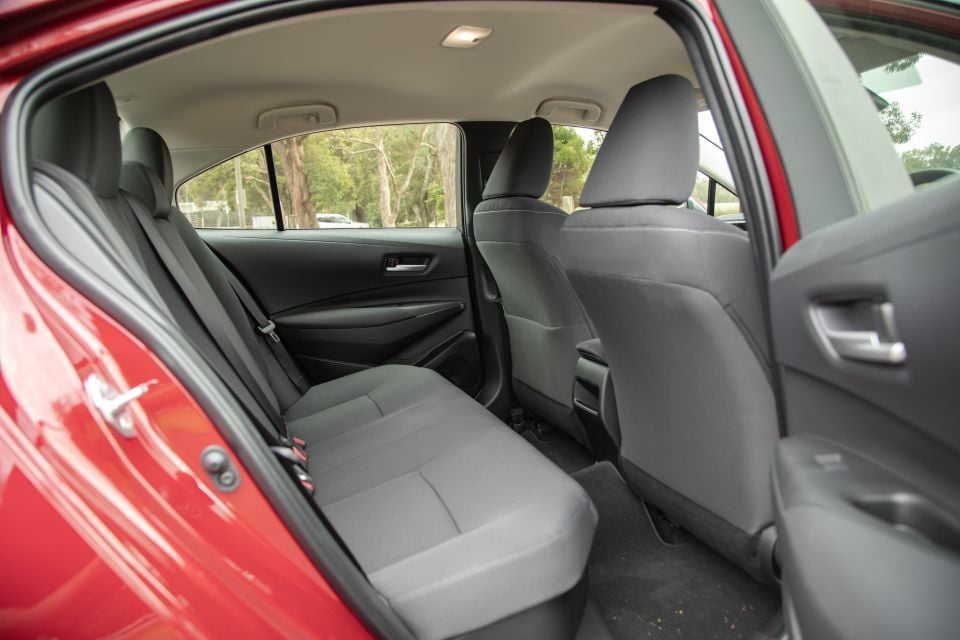
In the back seat there is a decent amount of space. Ample legroom for an adult of my size (6’0 or 182cm), but headroom is a little bit tight, as is toe room.
There are no air vents in the second row, which could be a problem on hot days. You’ll only find one map pocket on the passenger-side seatback. The door pockets are very small, though they might fit a compact bottle, but there is a fold-down armrest with cupholders, which is a nice touch.
Of course you also get the requisite ISOFIX child seat anchor points in the window seats, and three top-tether attachment points on the rear parcel shelf as well. In a nice touch for those who are fantastic passengers, there are grab handles for all four outboard positions.
But perhaps one of the most spectacular elements of the Corolla Sedan is the size of the boot.
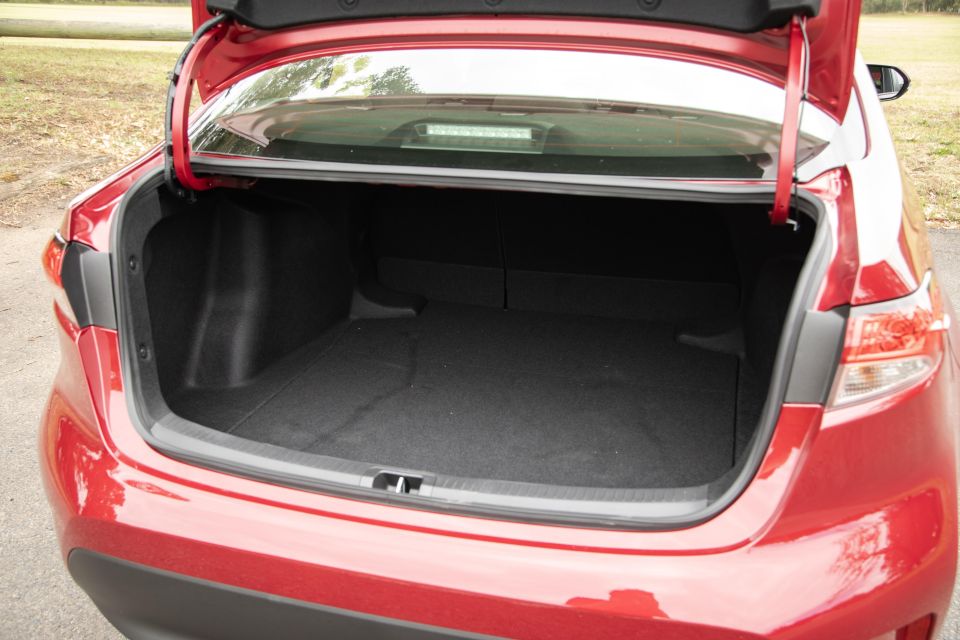
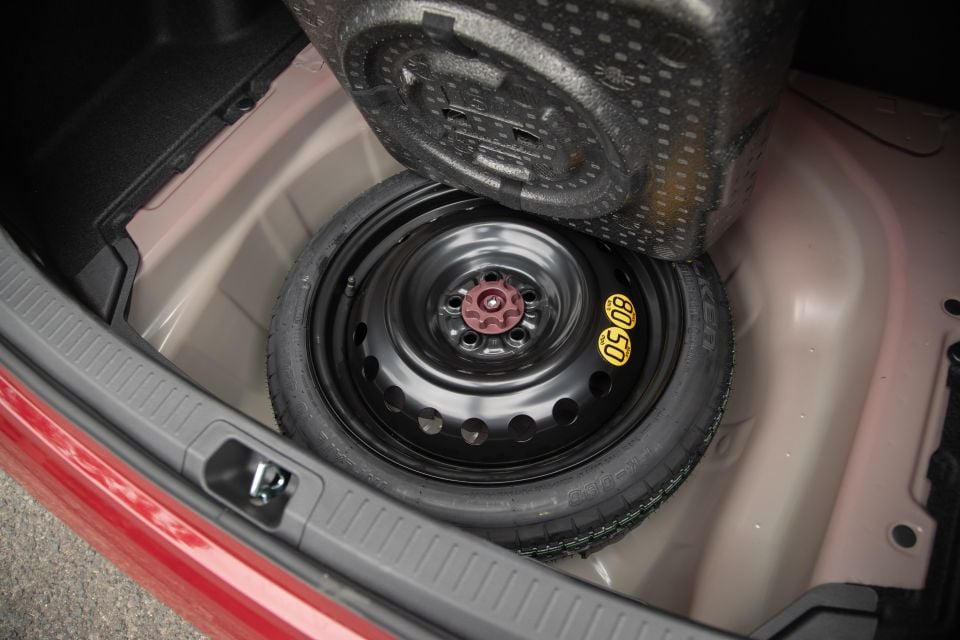
Remember, this is a pretty compact car at 4630mm long, 1435mm tall and 1780mm wide, with a 2700mm wheelbase – and yet it manages to offer 470 litres of luggage space, which is very generous.
However, it is impinged somewhat by gooseneck hinges on the boot lid. Also keep in mind you only get a space-saver spare wheel.
For those who often drop the seatbacks for even more storage, the Ascent Sport doesn’t have remote release triggers – you have to do that from the tops of the backseats.
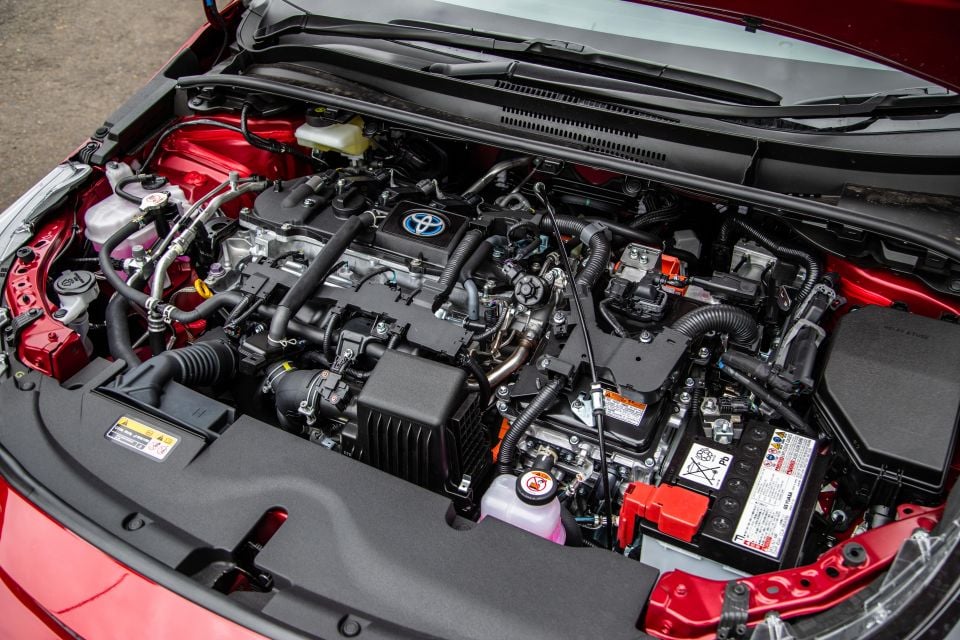
The 2023 Toyota Corolla range sees a change to the hybrid powertrain.
It still runs the same 1.8-litre naturally-aspirated petrol four-cylinder engine with an electric motor, but it has been reworked with a new high-output motor generator, revised power control unit and downsized hybrid transaxle, which Toyota says offers “improved performance”.
That translates to a higher combined power output of 103kW, up 13kW over the previous version. There’s no combined torque figure, because Toyota doesn’t state one. It runs an e-CVT (electronic continuously variable transmission) and is front-wheel drive.
The non-hybrid 2.0-litre four-cylinder petrol engine with 126kW of power and 203Nm of torque is going to appeal to fewer customers than the petrol-electric powertrain. It has a CVT auto with programmed ‘steps’ and a physical launch gear.
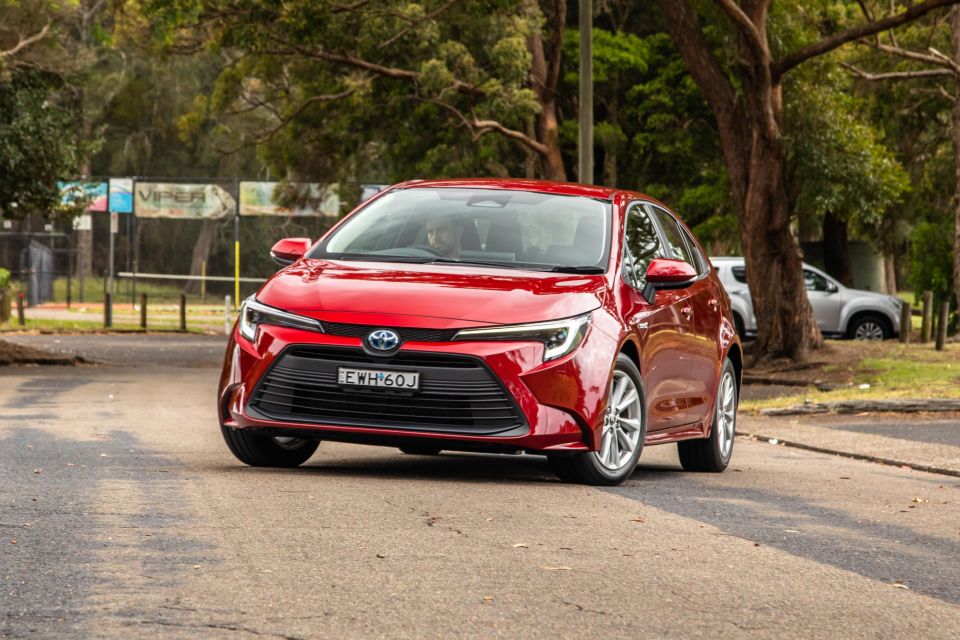
Inoffensively. But also really well.
You might have thought of a Toyota Corolla Sedan as being a dowdy grandad car, but it’s actually quite a good thing to pilot around.
The powertrain won’t reset your expectations for propulsion, but it is perky enough and definitely has enough pulling power to get a good jump from the lights when needed, or squirt through a gap in traffic without too much fuss.
It will be noisy when it does it – that’s the nature of the tried-and-tested hybrid powertrain and e-CVT combo – but it really gets the job done.
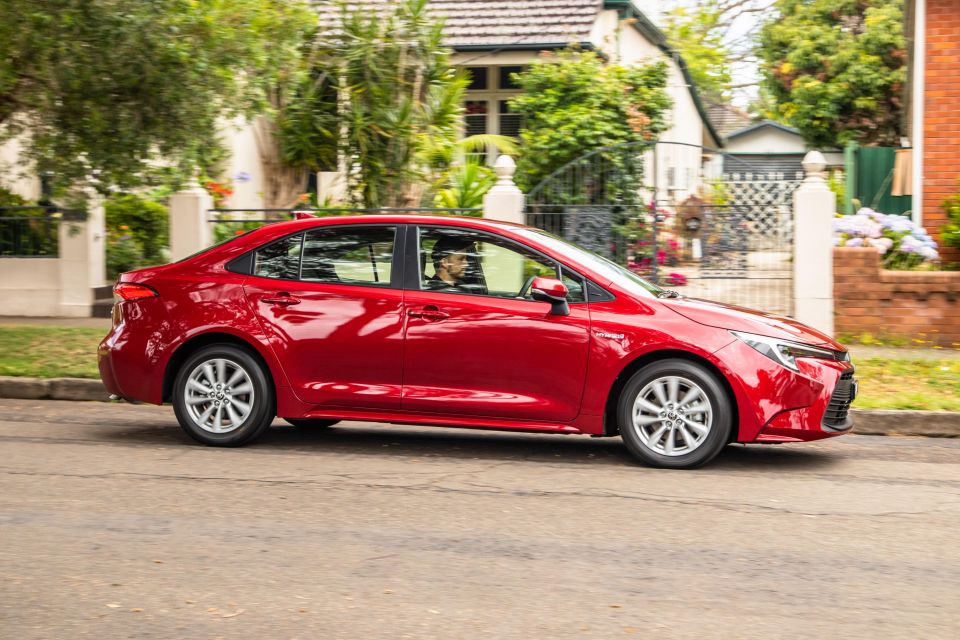
The best attributes of the Corolla Sedan – surprisingly – come from the chassis. The suspension tune is very composed and compliant, and it rides well but also corners with unexpected tenacity. You’ll run out of tyre grip before you find the limits of the car, that’s for sure.
The steering, too, is very impressive. It has good responsiveness at all speeds, and a natural feel to the way it’s weighted, too.
That isn’t going to matter to, er, probably every single Corolla Sedan Hybrid driver, but it’s nice to know that you can get your almost-guilt-free driver’s fix from an unassuming car like this.
It’s also relatively quiet inside – not much road noise or wind noise to speak of – and over a standard long-distance city commute like I usually do, it would be a fatigue-free experience, for the most part.
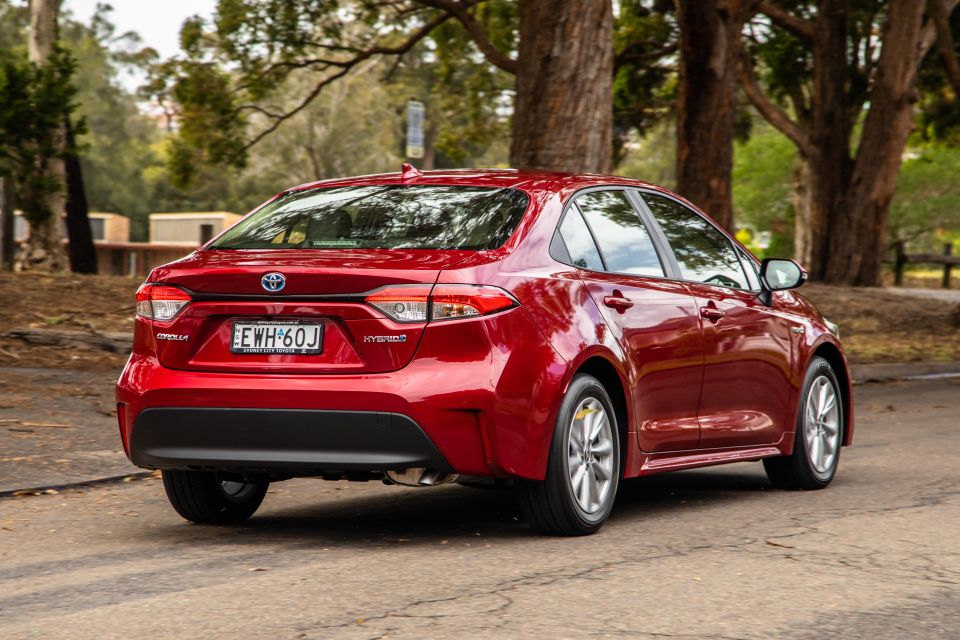
The steering-assist safety systems are simple to deactivate, but the lane centring system will still be active at higher speeds, and can interrupt you at times.
But the adaptive cruise control was good, and – in the interests of science – I also used the lane-keep system, and that wasn’t too bad either.
The surprising thing is that Toyota didn’t fit this press vehicle with the optional safety equipment – so, no blind-spot monitoring or rear cross-traffic alert, which I think is a shortcoming.
But for what it’s worth, the visibility from the driver’s seat isn’t too bad and the mirrors are good, so you could live without it, if you really needed to save the $1000.
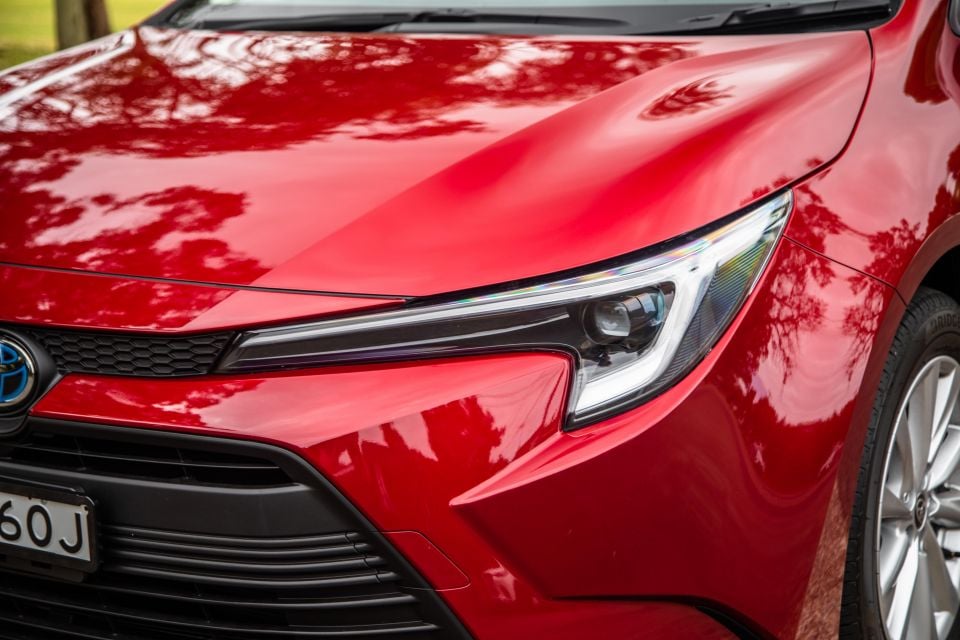

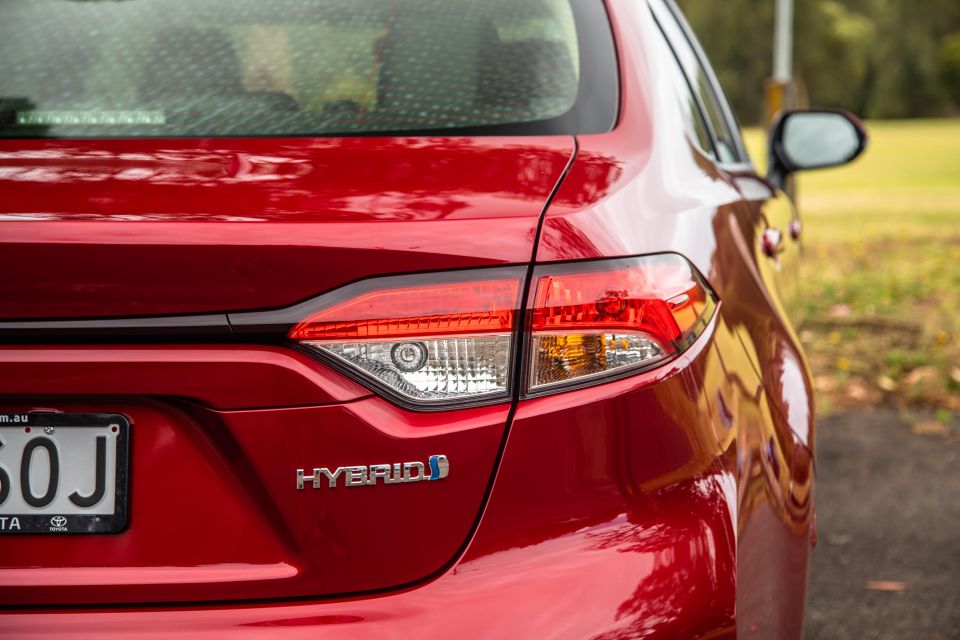

Corolla Ascent Sport highlights:
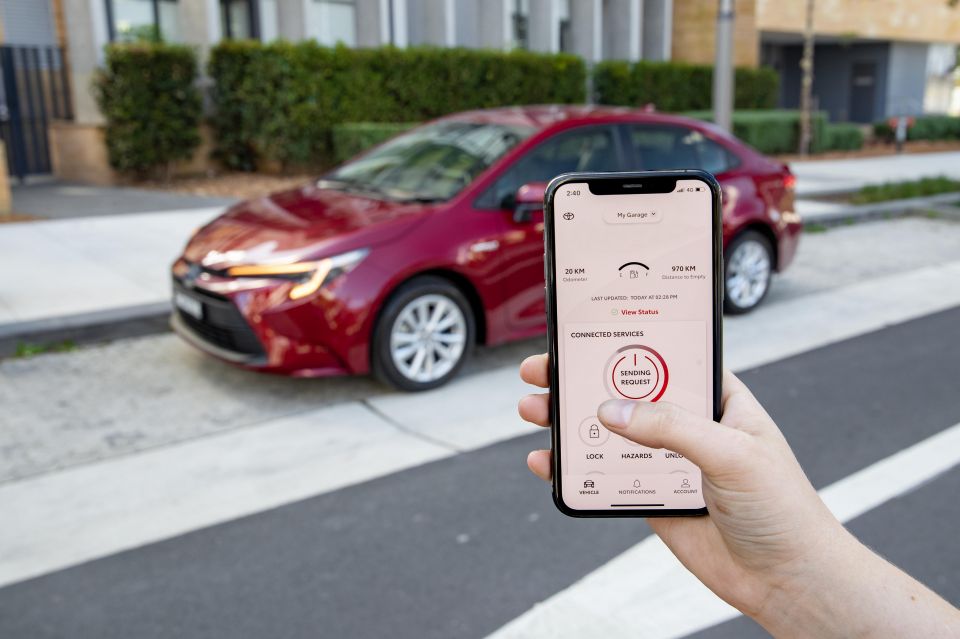
Where expert car reviews meet expert car buying – CarExpert gives you trusted advice, personalised service and real savings on your next new car.
Convenience Pack ($1000) adds:
The fact the price has gone up $4000 does help justify some of the inclusions, and let’s also remember that this is still a relatively affordable car given what has happened in the new-car market price-wise in the past 18 months.
But, as I said, I think that having to tick an option box for those safety items is uncharacteristic for Toyota. The plastic steering wheel is unpleasant to hold, too.
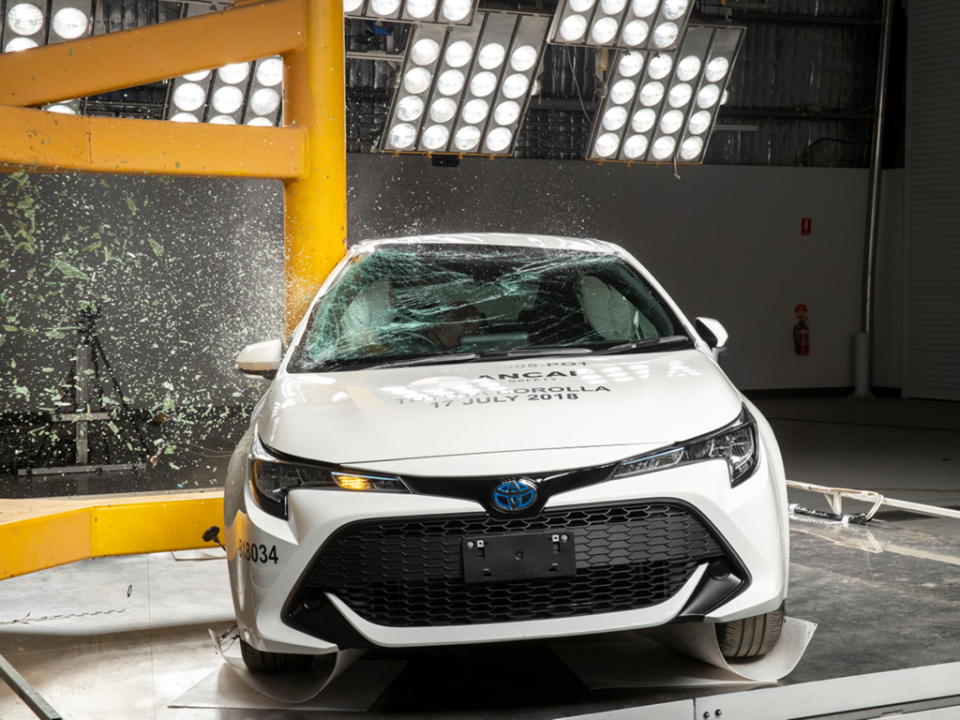
There won’t be an updated ANCAP crash test score for the Corolla – but it scored a five-star ANCAP safety rating against 2018 criteria for all sedan variants.
I feel like I’ve beaten the drum on “safety shouldn’t be optional” already, the convenience and peace of mind that blind-spot monitoring and RCTA give you can’t be understated – but both are available, so just give them another thousand bucks, okay?
Having said that, Toyota says the Corolla’s AEB system has been upgraded to include motorcycle detection and junction assist – the latter of which will stop you from trying to dart through a gap in oncoming traffic if it deems that you could put anyone in danger.
Emergency steering assist is standard now, too. It’ll adjust your line if it thinks you’re not going to.
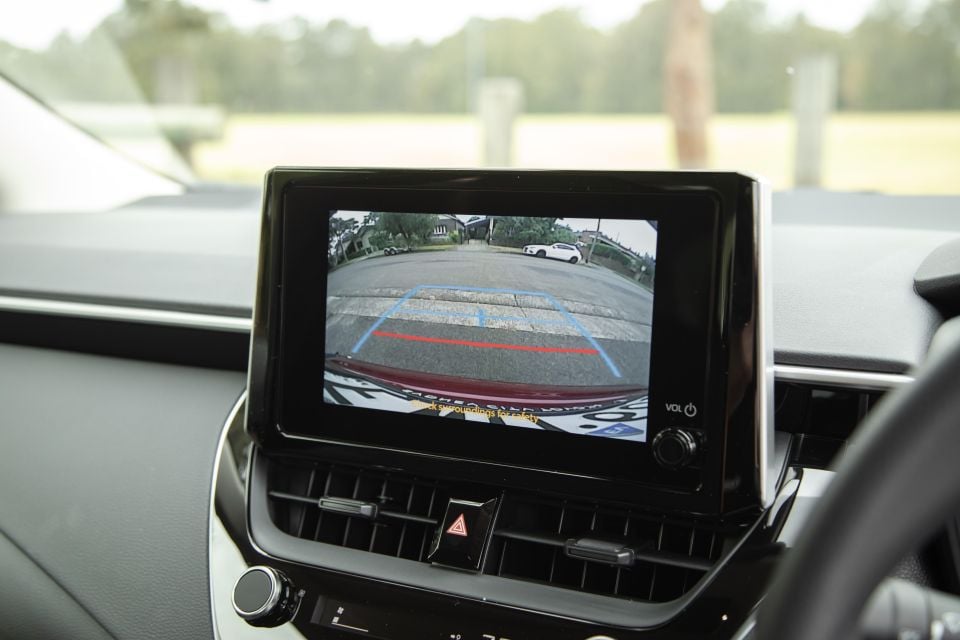
The brand’s lane-centring technology – Lane Trace Assist – now features an emergency stop feature that will bring the vehicle to a gradual halt if no driver inputs are detected.
There’s also a new acceleration suppression feature that reacts to sudden use of the accelerator when travelling at low speeds.
Adaptive cruise control now features four distance settings, as well as something called “deceleration assist” when changing lanes.
Plus, Toyota says it can now detect vehicles earlier, and unlike some other Toyotas, it doesn’t run away from you when radar cruise control is on (in some such examples, the car just beeps at you rather than braking as you descend hills).
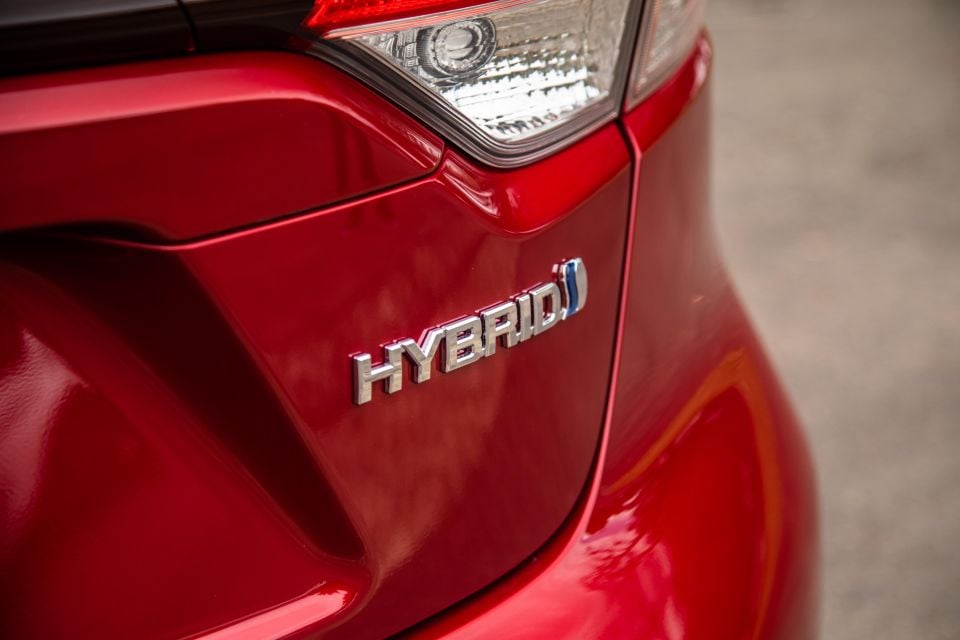
If you can achieve the sticker fuel consumption number, it’ll be very, very affordable to run this car.
The official combined cycle fuel consumption figure for the hybrid sedan is a paltry 3.9L/100km. On my test, I saw a little higher than that – but still an extremely frugal and very respectable 4.3L/100km.
Choose petrol-only, and you’ll need to prepare yourself to use almost twice as much go-juice. The official number is 5.9L/100km, but in the past I’ve seen closer to 9.0L/100km in regular driving.
The fuel tank capacity is 43 litres for hybrid models and 50 litres for petrol-only. Based on my real-world fuel consumption, that could mean as much as 955km from a single tank!
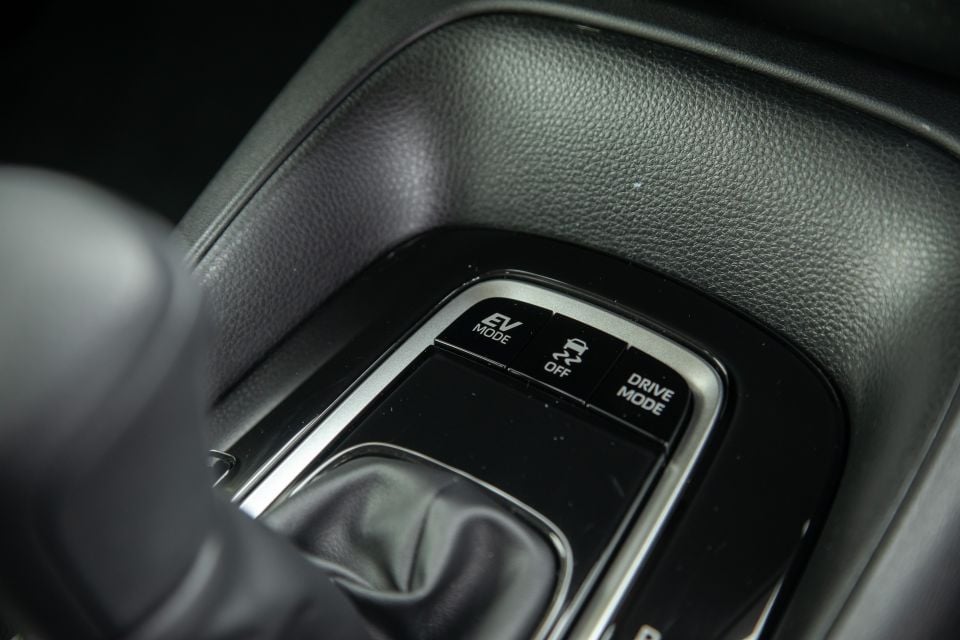
As for longer-term ownership considerations, the Toyota Corolla is covered by a five-year/unlimited-kilometre warranty.
There’s also an additional two years of warranty cover for the powertrain if you maintain logbook servicing, while if you get the car checked annually at a Toyota dealership you will get up to 10 years hybrid battery warranty included – the company does health checks each service to ensure it’ll meet requirements.
It requires servicing every 12 months or 15,000km – whichever comes first – with the first five services capped at $205 each. That is some seriously affordable motoring.
The only added cost you might want to keep in mind is roadside assist. Some brands include it, but Toyota doesn’t.
Still, set aside some maintenance money that you don’t actually need to spend, and you’ll be able to afford aftermarket roadside assistance easily.
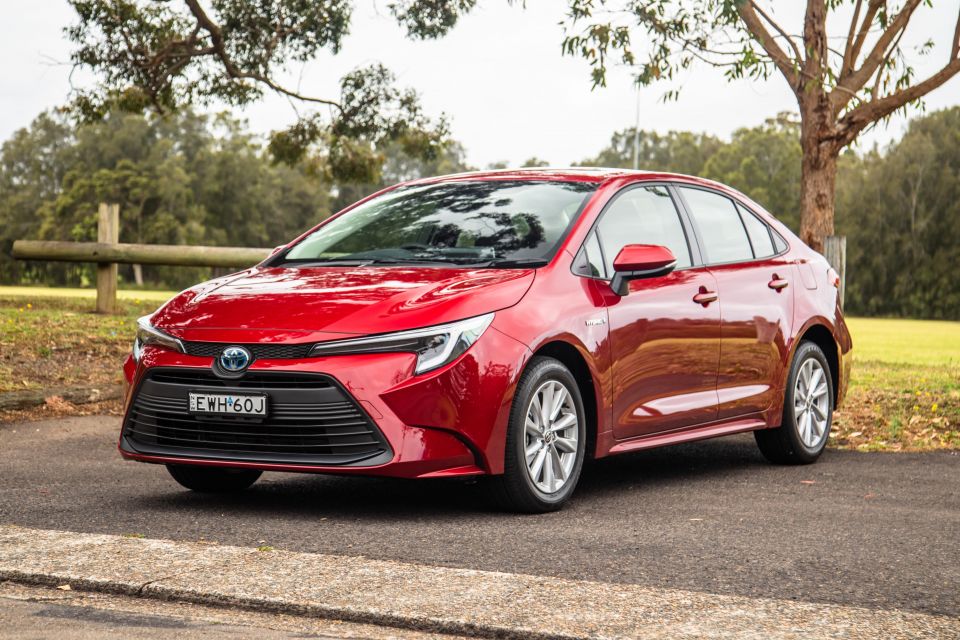
If you want a small sedan and you want a hybrid, choosing which spec of Corolla you want is the only choice you’ll really have to make.
I personally think there’s better value in the SX grade, as it adds a few niceties for not a whole lot more money.
But, if you’re budget-conscious and can live with a less-than-amazing interior feel, the Ascent Sport Hybrid sedan will be a great car for you to continue driving Uber in.
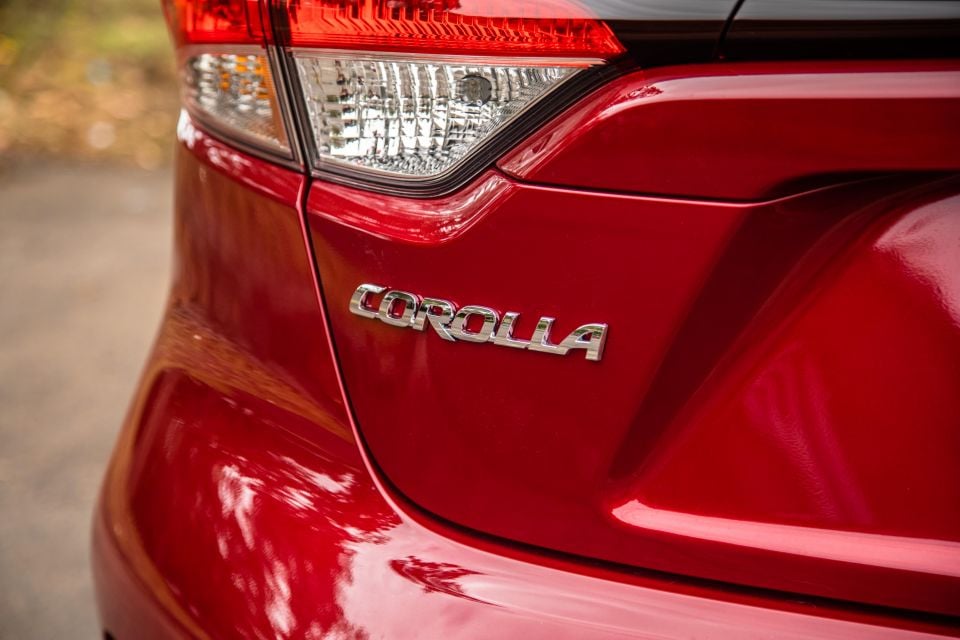
Click the images for the full gallery
Where expert car reviews meet expert car buying – CarExpert gives you trusted advice, personalised service and real savings on your next new car.
Matt has more than a decade of experience in automotive journalism, and loves exploring the pros and cons of new cars, delving into deep-dive industry stories, and going for a drive just for the fun of it.


Max Davies
7 Hours Ago
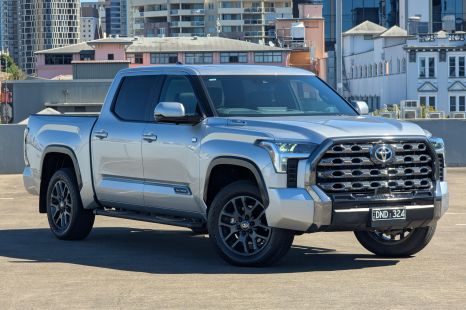

Damion Smy
1 Day Ago
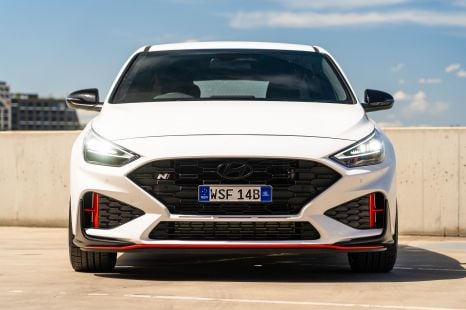

William Stopford
12 Days Ago
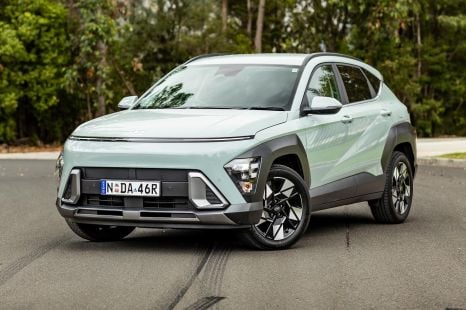

Matt Campbell
20 Days Ago
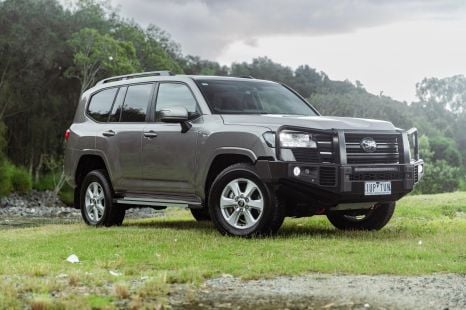

Damion Smy
20 Days Ago
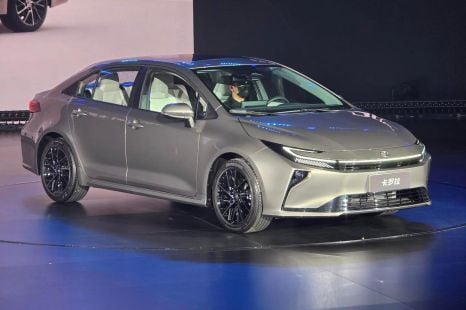

Damion Smy
24 Days Ago